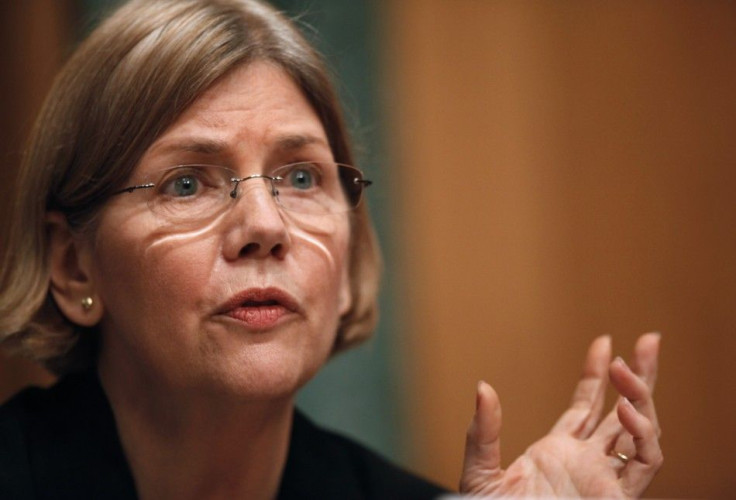After $2B JPMorgan Loss, Senate Candidate Elizabeth Warren Calls For 'New Glass-Steagall Act' [FULL TEXT]

In the wake of JPMorgan's $2 billion trading loss, U.S. Senate Democratic candidate for Massachusetts, Harvard Law professor and former White House adviser Elizabeth Warren is calling for a new Glass-Steagall law to separate investment and commercial banking.
The Glass-Steagall Act was a Depression-era law repealed in 1999 in order to let an assortment of banking institutions consolidate. The law's repeal, which brought down the firewall between investment and commercial banks, is considered one of the factors behind the 2008 economic crisis.
Warren, a Democrat who is challenging Sen. Scott Brown, R-Mass., in a nationally watched race, says JPMorgan's bungled derivatives trading demonstrate a need for a new Glass-Steagall Act. She sent out an email with the Progressive Change Campaign Committee -- a group that has raised more than $700,000 for her candidacy -- to push for stronger financial regulations.
This was the law that stopped investment banks from gambling away people's life savings for decades, Warren said. A new Glass-Steagall would separate high-risk investment banks from more traditional banking. It would allow Wall Street to take risks, but not by dipping into the life savings and retirement accounts of regular people.
There is already a ban to Wall Street giants' ability to trade with their own money, known as proprietary trading, under the Volcker Rule in the 2010 financial reform law, Dodd-Frank. The Volcker Rule has been dubbed Glass-Steagall lite.
JPMorgan's trading loss has reignited the debate on financial reform as Dodd-Frank, including the Volcker Rule, goes through a rule-making process by federal regulators.
Warren is using the JPMorgan fiasco to hammer Brown on financial regulation, a recurring issue in the campaign.
Before launching her campaign against Brown, who won a 2010 election to fill out the late Sen. Ted Kennedy's term, Warren was the architect of the White House's newly minted Consumer Financial Protection Bureau.
Warren has called Brown Wall Street's favorite senator, a moniker she repeated Monday on CNN, and called for JPMorgan CEO Jamie Dimon to give up his seat on the New York Federal Reserve board following the $2 billion loss.
The Brown campaign, meanwhile, has stayed out of the fray on financial regulations, instead criticizing Warren over universities that listed her as a minority due to her slight Native American heritage. She had also listed herself as a minority in a law school directory at a university where she taught. Warren told the Boston Herald that she never tried to take advantage of her minority status to land a position.
A spokesman for Brown did not immediately return a request for comment.
Read the letter below (bolding in the original):
We've seen all the headlines: JP Morgan Chase took risky bets and lost two billion dollars in a matter of weeks.
CEO Jamie Dimon called the bets poorly reviewed and even sloppy. He added, We will learn from it, we will fix it, and we will move on.
Frankly, I don't think we should just trust Wall Street banks to regulate themselves. Because as we learned during the 2008 financial crisis, they are not just taking risks with their own money -- they are taking risks with the whole economy.
That's why today, with the Progressive Change Campaign Committee, I'm calling on Congress to put Wall Street reform back on the agenda and to begin by passing a new Glass-Steagall Act. This was the law that stopped investment banks from gambling away people's life savings for decades -- until Wall Street successfully lobbied to have it repealed in 1999.
A new Glass-Steagall would separate high-risk investment banks from more traditional banking. It would allow Wall Street to take risks, but not by dipping into the life savings and retirement accounts of regular people.
And by making banks smaller, a new Glass-Steagall could also help put an end to banks that are too big to fail -- further avoiding costly taxpayer bailouts.
Wall Street's risky bets nearly brought the economy to its knees in 2008. But instead of taking responsibility, Wall Street lobbied to water down the Dodd-Frank financial reforms of 2010 and fought to weaken the reforms Congress passed.
It has become clear over time -- and made even clearer this past week -- that additional Wall Street reforms are needed.
Thousands of Progressive Change Campaign Committee members have stood with me in my campaign for the Senate -- and many were with me before that when I was fighting for the Consumer Financial Protection Bureau. I thank you from the bottom of my heart.
If I'm elected to the U.S. Senate from Massachusetts, I promise this difference from my Republican opponent Scott Brown: I will be a reliable and strong champion for commonsense Wall Street reform. But we don't have a moment to waste.
Together, we must urge Congress to act now.
Thank you,
Elizabeth Warren
© Copyright IBTimes 2024. All rights reserved.




















